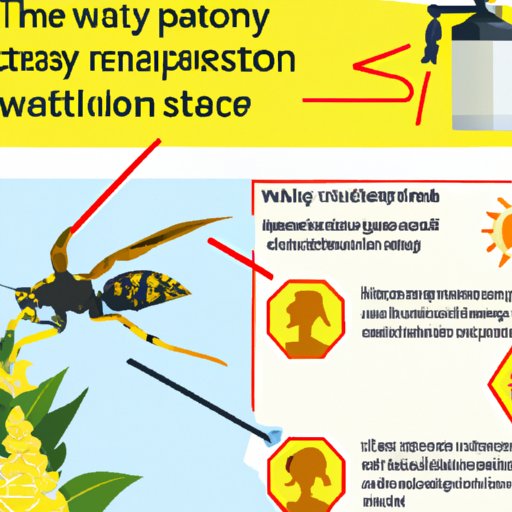Introduction
Wasp spray is an insecticide used to kill wasps, hornets, and yellow jackets. It is often found in aerosol cans and comes in a variety of forms ranging from foam to dust. Wasp sprays are effective at killing these pests, but it’s important to understand how they work so that you can use them safely and effectively.
Exploring the Chemical Composition of Wasp Spray
Wasp spray typically contains active ingredients such as pyrethrins, permethrin, or carbaryl. Pyrethrins are derived from chrysanthemum flowers and act as a neurotoxin to insects, disrupting their nervous systems and causing paralysis. Permethrin is a synthetic version of pyrethrin used to enhance the potency of the spray. Carbaryl is an insecticide that works by blocking neurotransmitters in the insect’s nervous system.
These active ingredients work together to form a powerful insecticide that is highly effective at killing wasps. The active ingredients are mixed with other chemicals, such as propellants and surfactants, which help the spray spread evenly and stick to surfaces.

Examining the Effectiveness of Wasp Spray
The effectiveness of wasp spray depends on several factors. First, the type of pesticide used in the spray will determine how effective it is. For example, some wasp sprays contain more powerful active ingredients than others. Second, the concentration of active ingredients in the spray will also influence its effectiveness. Higher concentrations of active ingredients will be more effective than lower concentrations.
Finally, the environment where the wasp spray is used will also affect its efficacy. Windy conditions can reduce the effectiveness of the spray, while warm temperatures can increase its effectiveness. To get the best results from wasp spray, it is important to use it when weather conditions are favorable.
Investigating the Safety of Wasp Spray
When used correctly, wasp spray is generally safe for humans and animals. However, it is important to take precautions when using wasp spray to minimize any risks. For example, it is important to avoid breathing in the spray, and it should never be sprayed directly onto people or pets. Additionally, it is important to read the label carefully and follow the instructions provided.
In addition to potential health risks, it is important to consider the environmental impact of wasp spray. Many wasp sprays contain chemicals that are toxic to aquatic life and can contaminate waterways if not used properly. Therefore, it is important to use wasp spray responsibly and dispose of it properly.
Comparing Wasp Spray to Other Pest Control Methods
Wasp spray is one of many pest control methods available. It is relatively inexpensive and easy to use, making it an attractive option for many homeowners. However, there are other options available, such as traps and baits, which may be more effective at controlling wasp populations. Additionally, some pest control methods, such as biological control, are more sustainable and less harmful to the environment.
When choosing a pest control method, it is important to consider the cost, effectiveness, and environmental impact of each option. For example, traps may be more expensive than wasp spray but may be more effective at controlling wasp populations. Additionally, some pest control methods, such as biological control, may be more sustainable and less harmful to the environment.

Analyzing the Pros and Cons of Using Wasp Spray
Wasp spray has both advantages and disadvantages. On the plus side, it is relatively inexpensive and easy to use. Additionally, it is effective at killing wasps, hornets, and yellow jackets. On the downside, it can be hazardous to humans and animals if not used properly. Additionally, it may not be as effective at controlling wasp populations as other pest control methods.

Discussing Best Practices for Using Wasp Spray
To ensure safety and effectiveness, it is important to follow certain steps when using wasp spray. First, read the label carefully and follow all instructions provided. Next, wear protective clothing, such as gloves and long sleeves, when applying the spray. Finally, store the spray in a secure, dry place away from children and pets.
It is also important to take proper safety precautions when using wasp spray. Never spray directly onto people or pets, and always keep the spray out of reach of children. Additionally, it is important to properly dispose of the spray after use to prevent contamination of waterways.
Conclusion
Wasp spray is an effective and relatively inexpensive pest control method. However, it is important to understand how it works and take proper safety precautions when using it. Additionally, it is important to compare different pest control methods and choose the one that best meets your needs.
By understanding the chemical composition of wasp spray, examining its effectiveness, investigating its safety, comparing it to other pest control methods, analyzing the pros and cons of using it, and discussing best practices for using it, you can make sure that you are using it safely and effectively.
(Note: Is this article not meeting your expectations? Do you have knowledge or insights to share? Unlock new opportunities and expand your reach by joining our authors team. Click Registration to join us and share your expertise with our readers.)
